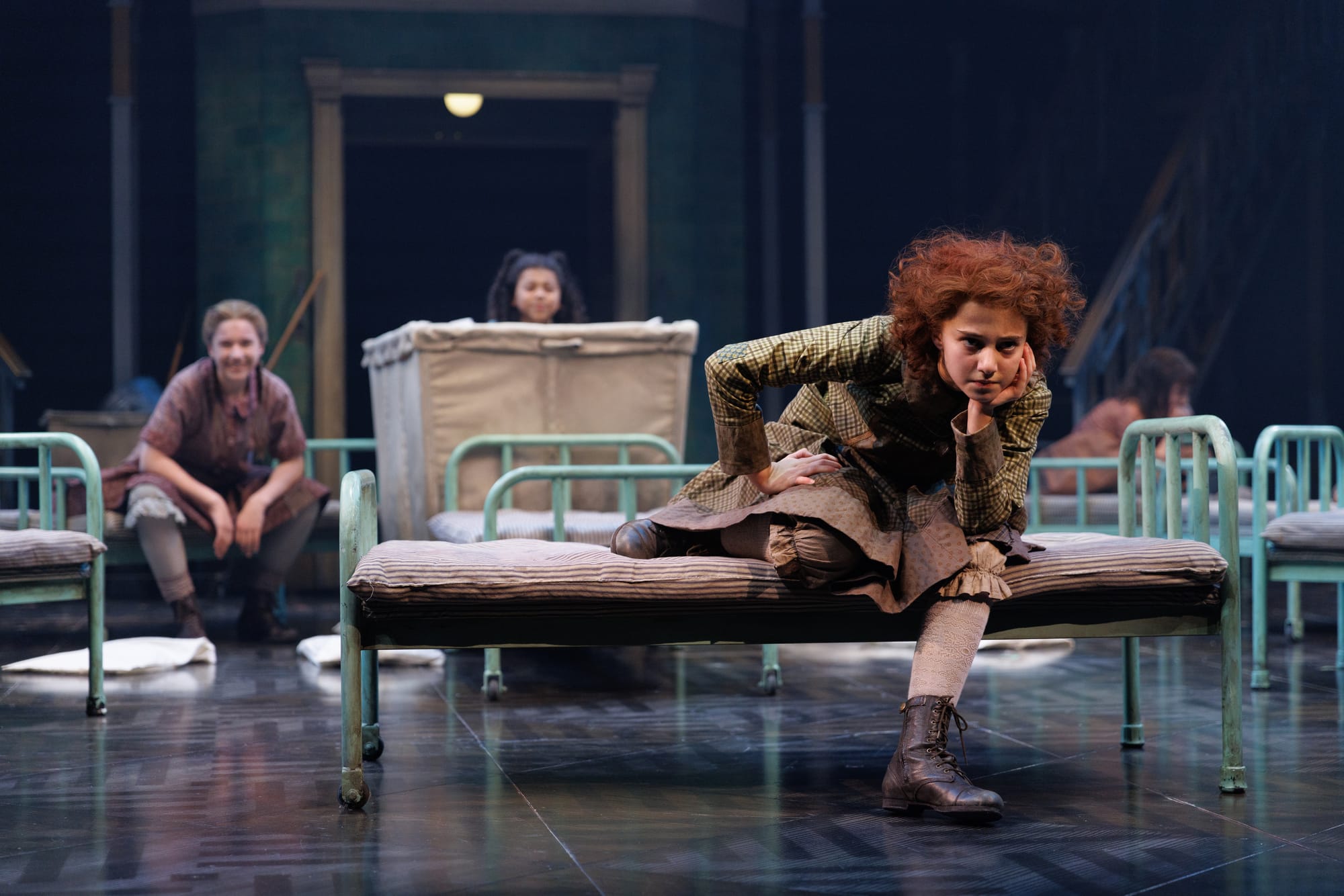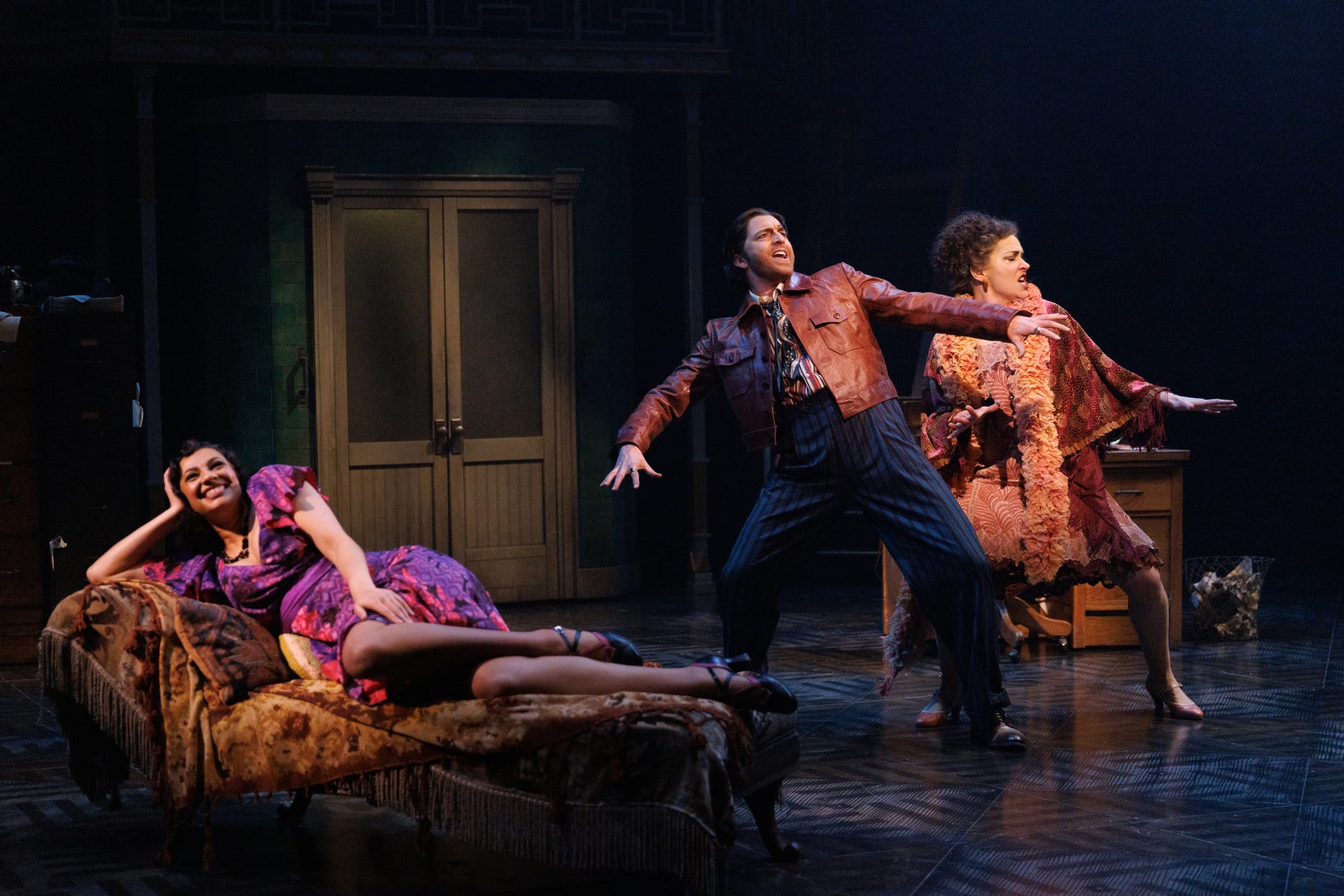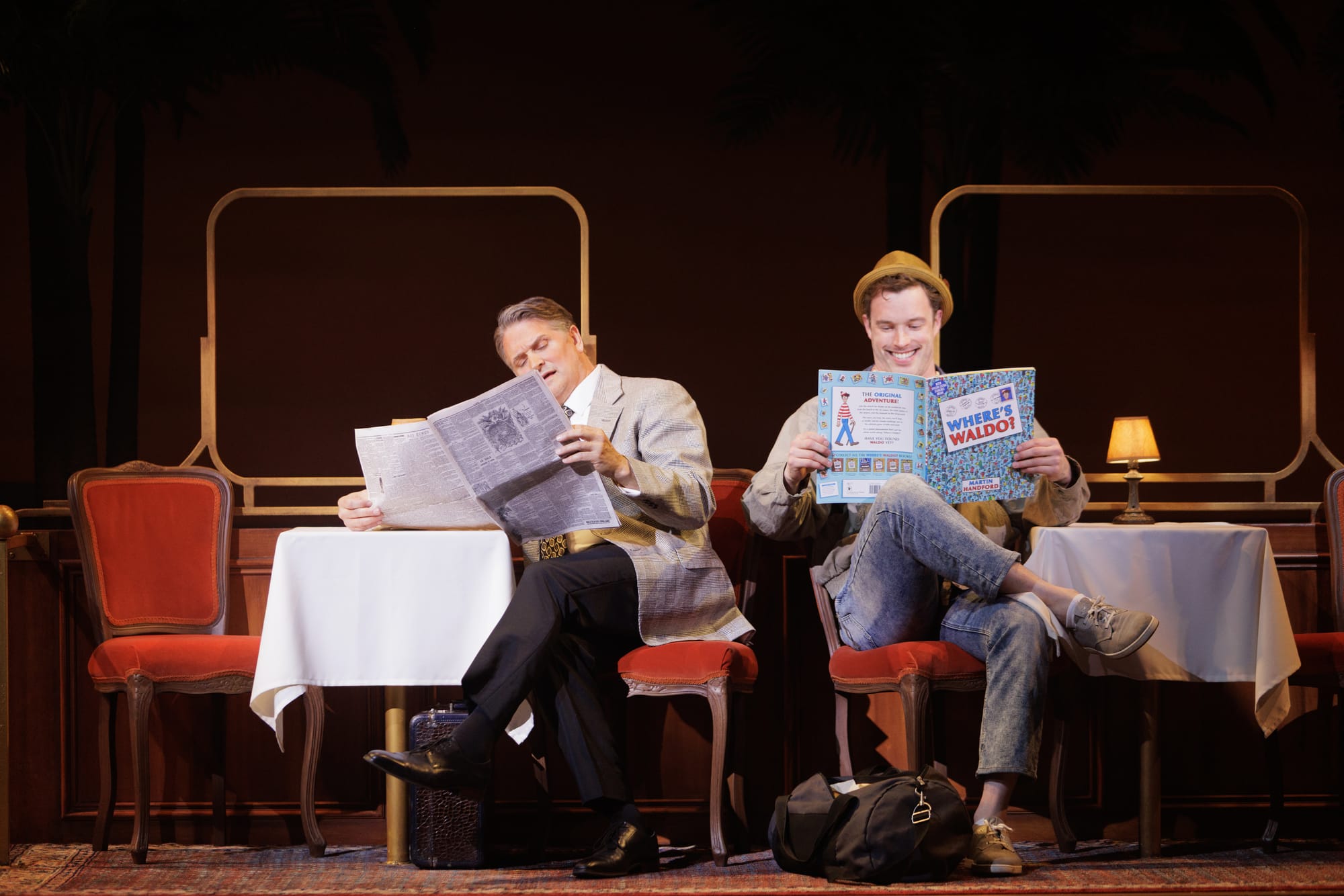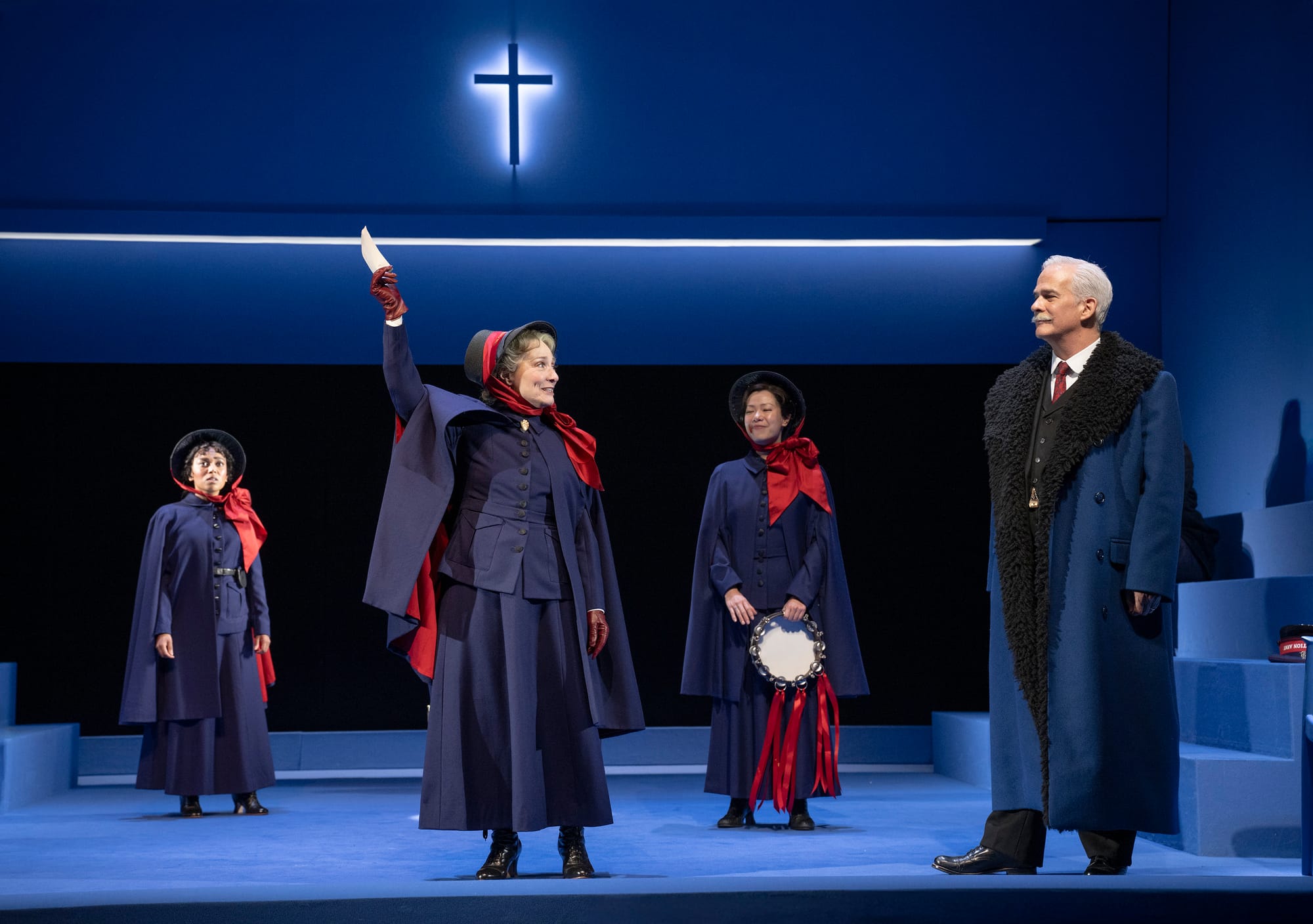Naughty or nice: Stratford Festival musicals pay off big time
The sunny Annie and the darkly funny Dirty Rotten Scoundrels both deliver first-rate entertainment

Cynicism or optimism?
You can take your pick with the Stratford Festival’s two musical offerings this season. One lifts up its chin to greet the new day with hope, while the other slips on sunglasses, affects a Continental accent and slinks away, pocketing some extremely dark laughs before it disappears.
Both, thankfully, are very entertaining, although one is a bonafide classic, while the other never quite reaches the first tier of musical theatre.
The classic, of course, is Annie (Rating: ✭✭✭✭), Charles Strouse (music), Martin Charnin (lyrics) and Thomas Meehan’s (book) beloved 1976 musical about the redheaded orphan in Depression-era New York whose spunk and energy not only get her a happy ending but help lift her country out of the financial doldrums.
Director Donna Feore’s production works surprisingly well, even for so famous a show. Annie was the Wicked of its day, and it can suffer from overexposure and familiarity. (Some casting agents used to bar the song “Tomorrow” when auditioning girls for musicals.)
But it’s a remarkably well-constructed work, with a distinct setting, a sympathetic young underdog heroine with a clear goal — Annie’s “I want” song, “Maybe,” establishes her longing to reunite with the parents who dropped her off at the orphanage 11 years earlier — and a series of catchy, tuneful songs that always add to the world of the show, or character, plot, or more. And speaking of underdogs, there’s even a real dog (Clue at the performance I saw) wagging its tail and hankering for onstage treats.
(I recently listened again to the original Broadway cast album, which was the first OBC I ever heard, borrowed from the public library. There are absolutely no skips.)
Feore, who also choreographs, adds some intriguing elements to her production, which chronicles Annie’s (Harper Rae Asch) rise in fortunes, thanks to her unlikely benefactor, billionaire industrialist Oliver Warbucks (Dan Chameroy), who in a spirit of charity tasks his secretary, Grace Ferrell (Jennifer Rider-Shaw), with finding him an orphan to entertain for two weeks during the Christmas of 1933.
Feore brings out the vaudevillian spirit of certain numbers like “Easy Street” and “I Don’t Need Anything But You.” She also adds a sensual, jazzy dance break in the mid-show number “NYC,” which opens as forthright and direct as Warbucks himself but then soon slips into something with more edge and excitement, the score full of pizzazz under music director Laura Burton.
Other additions — cartwheeling orphans in a song about being mistreated, a fight for the microphone at the live radio taping of a show — feel overworked and gratuitous. Even in the above-mentioned NYC number, some of Feore’s additions disrupt the flow of what is usually a lovely section involving a star-to-be (Jamie Murray) who just got into town.
The worst bit of over-choreographing is having Annie test the limits of the Warbucks staff by attempting to topple over a vase or tossing a plate of food in the air for the workers to catch. This goes against her character, and makes her seem spoilt and entitled.
While Michael Gianfrancesco’s set isn’t the most detailed or elaborate, the Festival Theatre’s staircase and raised walkway at the back of the stage are used to wonderful effect in two locales. In a scene set at a makeshift encampment full of people who blame former president Herbert Hoover for their current economic plight, it suggests overhead railroad tracks; and in the scenes in the Warbucks mansion they fit right into the art deco design.
His impeccable costumes help tell the story on their own, immediately establishing class, age and station.
The casting is, as Annie herself might say, pretty swell. (Note: I love how period-specific Charnin’s lyrics are without being confusing. This time around, I looked up who Beau Brummell was.) The gifted Asch has a spunky stage presence, clear and powerful voice (sometimes her vowels go astray in high notes) and backs it up with genuine emotion. Her fellow orphans are distinctly etched, and they execute the songs and choreography with gusto.

Laura Condlln devours the part of Miss Hannigan, the libidinous, alcoholic matron of the orphanage, making up in acting what she lacks in vocal finesse. The show’s fun metre goes off the charts when Hannigan’s ex-con brother, Rooster (Mark Uhre), and his plus-one Lily St. Regis (Amanda Lundgren), arrive and the group hatches a scheme to profit off Annie’s fortune. I could watch the three slink and shimmy through “Easy Street” all night.
Rider-Shaw handles the often thankless role of Grace with warmth, charm and a silvery soprano voice; she’s no pushover when it comes to the Hannigans, and her potential romance with her distracted boss never upstages the concerns of her little charge.
The old saying — often attributed to W.C. Fields — to never work with kids or animals doesn’t apply to Chameroy. Sans bald cap (good choice), he delivers the show’s strongest performance: gruff and firm at the start, hard-nosed with FDR (Stephen Patterson) and his handlers, and as his temporary ward’s optimistic spirit begins affecting him, increasingly gentle and paternal.
A challenge with any new production of Annie is how to present the Warbucks-Annie relationship without a trace of ickiness. And considering the political dumpster fire occurring south of the border, the show’s plot point about a billionaire Republican businessman giving advice to a sitting president might also seem like art imitating depressing reality.
It’s to Feore and her cast’s credit that none of that registers here. As the show’s title song claims, the red-headed tyke kicks out the blues. At least for two-and-a-half hours.
Annie continues at the Festival Theatre, 55 Queen St., Stratford, until November 2. See info here.

Money motivates a lot of the story in Annie, where the disparity between the rich and poor is astronomical. One of the most poignant moments in the musical comes when Annie, shown a night on the town by her new benefactor, sings, “To think that I’ve lived here all of my life / And never seen these things.” Indeed.
Filthy lucre is also a big theme in Dirty Rotten Scoundrels (Rating: ✭✭✭), David Yazbek and Jeffrey Lane’s cynical musical comedy about two very different con men who are grifting their way along the French Riviera.
Lawrence Jameson (Jonathan Goad) is a suave, elegant middle-aged man who poses as an exiled prince to entice wealthy women — mostly American — to give him donations for his exotic country’s cause.
Having heard from his confidante, the police chief André (Derek Kwan), that a competing con artist nicknamed The Jackal is about to descend on their territory, Lawrence spots a two-bit hustler named Freddy Benson (Liam Tobin) on a train. The younger man wants to learn from the more experienced one, but what’s in it for Lawrence?
After Freddy helps get him out of a jam involving a wealthy, possessive Texas oil heiress (a hilarious Michele Shuster), the pair set their sights on a new mark, Christine Colgate (Shakura Dickson), who’s nicknamed the Soap Queen because of her family’s fortune.
The men make a bet; whoever bilks $50,000 from her will stay on; the loser will leave town. And so begins a series of disguises, crosses and double-crosses.
It takes an awful long time for Lane’s book — loosely based on the 1988 film — to establish the stakes for all the players. And the songs by Yazbek (The Full Monty, The Band’s Visit and the recent Dead Outlaw), while clever, aren’t memorable enough to provide much forward momentum. There’s also a metafictional aspect to the show that never properly delivers dividends.
But director Tracey Flye and her talented design team and cast offer up a sparkling, bubbly concoction that makes you forget all that and just give in to the laughs.
The three leads all have a chance to shine, especially Tobin, whose cocky, strutting role here is better suited to his leading man qualities than his Sir Dennis Galahad two seasons ago.
Flye also gracefully interweaves the amusing subplot involving Muriel (Sara-Jeanne Hosie), one of Lawrence’s marks, and Kwan’s André, that becomes more and more delightful as it goes along.
Like a glass of champagne, Dirty Rotten Scoundrels has very little nutritional value. But it produces a buzz that’s quite enjoyable.
Dirty Rotten Scoundrels continues at the Avon Theatre, 99 Downie St., Stratford, until October 25. See info here.

Shaw Festival x2
I have yet to see the Shaw Festival’s big musical, Anything Goes, but I did catch two of the plays on this year’s bill: the silly 1920s farce Tons of Money (Rating: ✭✭), and the fest’s sole Shaw offering this season, Major Barbara (Rating: ✭✭✭).
Of the two, I recommend the Shaw, even if the actor in the title role is miscast and over-powered by her co-stars. Peter Hinton-Davis’s spare yet eclectic production makes you focus on the playwright’s absorbing dialogue. Both are playing until late fall. You can find my reviews here and here.
Coming up: Shakespeare at Stratford; a report from the Blyth Festival; highlights from the Dora Awards; and Fringe reviews.
